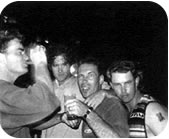
THE DANGERS OF STAGE HYPNOSIS
1.) PHYSICAL CASUALTIES
Physical casualties are one of the dangers of stage hypnosis. On many occasions people will sustain minor injuries. These can occur from falling off their chair to the more dangerous accidents like falling off the stage.
There was an episode during the early 1990s that was reported in the press about a girl who walked off the edge of the stage at Glasgow Pavilion. She asked the hypnotist if she could go to the toilet, to which he said, "Yes of course, take the nearest exit." His comment was given harmlessly, yet the girl walked straight off the edge of the stage and injured herself by breaking her ankle. Approximately five years later it was Glasgow Pavilion that was sued for damages, not the hypnotist.
reported in the press about a girl who walked off the edge of the stage at Glasgow Pavilion. She asked the hypnotist if she could go to the toilet, to which he said, "Yes of course, take the nearest exit." His comment was given harmlessly, yet the girl walked straight off the edge of the stage and injured herself by breaking her ankle. Approximately five years later it was Glasgow Pavilion that was sued for damages, not the hypnotist.
At a Christmas show for Plymouth University I had a girl slip over on a wet dance floor. She badly dislocated her arm. The accident was caused by the wet dance floor, with the responsibility falling onto the owners of the venue where I was performing. Physical accidents do happen, but fortunately the human body heals quickly - it is the psychological accidents that can be so very dangerous, and is one of the most common dangers of hypnosis.
2) DEPRESSION FROM REJECTION AND DAMAGE TO THE PSYCHE
When a hypnotist asks for volunteers quite often a large number of people, maybe 20 or 30, will put themselves forward. Very quickly the hypnotist will reduce this number of people down to 15 or 20, take them all into trance as he continues with the start of  his show. His eventual goal is to have 10 or 12 subjects all of whom are in deep somnambulism. Quite shortly it becomes obvious to the stage hypnotist (and to the audience) that 1, 2, 3, 4, 5, or 6 or more of the volunteers are not in very deep trance, and not responding to his suggestions like some of the other volunteers are, so the hypnotist sends them back into the audience. He really only wants to work with subjects that are in true somnambulism, so he can produce these wild hallucinations and other bizarre post-hypnotic suggestions.
his show. His eventual goal is to have 10 or 12 subjects all of whom are in deep somnambulism. Quite shortly it becomes obvious to the stage hypnotist (and to the audience) that 1, 2, 3, 4, 5, or 6 or more of the volunteers are not in very deep trance, and not responding to his suggestions like some of the other volunteers are, so the hypnotist sends them back into the audience. He really only wants to work with subjects that are in true somnambulism, so he can produce these wild hallucinations and other bizarre post-hypnotic suggestions.
Now the volunteers he has sent back into the audience because their depth of trance wasn’t deep enough, even though they were in a level of trance, for some, not all of them, but may be just one of them, they could well feel, “I wasn’t good enough.” This rejection, and the feeling that comes with it may only last a minute or so, or may be for the evening , or may be even the next few days, or may be stuck in the subconscious mind permanently. There is no rule of thumb with hypnosis. “The I am not good enough” could be a direct cause for severe depression, and the subject not even aware of the original trigger that created it.
It is this rejection feeling of, 'I'm not good enough', which can happen so very easily, and then be trapped in the subconscious mind. Again it depends upon the individuals’ own personal psychological and neurological make up. No one can tell what that is until the damage has been done, and then it can't be proven that this person's personality change was caused through the medium of hypnosis. This is what I mean by depression from rejection and damage to the psyche.
3.) MISINTERPRETATION OF SUGGESTIONS
When giving a suggestion to someone under hypnosis it is very easy for them to misinterpret what you have said. The above story of the girl at Glasgow Pavilion is an example of this. Also, one of the most important things that a stage hypnotist must do is to remove all suggestions at the end of the show. Sometimes when you give a suggestion to just one particular individual another person also will react to the suggestion given. Occasionally this will be a member of the audience. As previously mentioned true stage hypnosis is mass hypnosis. Without the hypnotist realizing this, how is he to know that the suggestion has been removed not only from the individual involved, but also from everyone's subconscious mind, including the audience, which then leads us onto the next danger....
4) RE-STIMULATION OF A POST-HYPNOTIC SUGGESTION
Going back to serious accidents happening in hypnotic shows reminds me of another story. It was during my early days as a stage hypnotist. A young lady had been involved in a hypnotic show that a colleague of mine, by the name of Ian, had performed. Four days later, having been in Ian's hypnotic show, this young lady was in a supermarket carrying out some shopping. Music started to play in the background. It was the very same music that she had heard during a suggestion she was given while in his hypnotic show. Suddenly she stopped shopping and started to prance around the supermarket as though she was a famous model. She was with some friends fortunately; they realized exactly what was happening. They took her to see three or four different hypnotherapists who couldn't help this young lady. Her friends then contacted the venue where the show had been performed. The venue contacted the agent and the agent contacted Ian the hypnotist. He in turn contacted me and asked if I could help (because he lived 200 miles away). Back through the chain, and the young lady eventually turned up on my doorstep in Nottingham. I could see immediately that she was in a very deep trance. A click of my fingers, a glare into her eyes, simultaneously stating, "Sleep", and she fell into the armchair behind her. I suggested she was in the hypnotic show in which she had participated. I had a good idea of this other hypnotist's act and ran a super-fast scenario of it. I then brought her out of trance slowly and gradually. She was in a level of shock not knowing where she was, how she got there, or what had happened over the previous week. I spent some time talking to her ensuring that she felt re-adjusted, and never saw or heard of her again.
the supermarket as though she was a famous model. She was with some friends fortunately; they realized exactly what was happening. They took her to see three or four different hypnotherapists who couldn't help this young lady. Her friends then contacted the venue where the show had been performed. The venue contacted the agent and the agent contacted Ian the hypnotist. He in turn contacted me and asked if I could help (because he lived 200 miles away). Back through the chain, and the young lady eventually turned up on my doorstep in Nottingham. I could see immediately that she was in a very deep trance. A click of my fingers, a glare into her eyes, simultaneously stating, "Sleep", and she fell into the armchair behind her. I suggested she was in the hypnotic show in which she had participated. I had a good idea of this other hypnotist's act and ran a super-fast scenario of it. I then brought her out of trance slowly and gradually. She was in a level of shock not knowing where she was, how she got there, or what had happened over the previous week. I spent some time talking to her ensuring that she felt re-adjusted, and never saw or heard of her again.
5) LOSS OF CONTROL
As for my own show, I would adjust the show to the audience. Family shows were always a little tamer than an adult show, and a lot would depend upon the audience’s reactions to how risque would allow the show to become. I have never told or suggested for anyone to strip naked. Having said that, quite often I would end my show with the Chippendales. As soon as the men had stripped off to their boxer shorts or 'Y' fronts I would stop the music, and the volunteers would come back to a level of waking consciousness. During a show at Butlin's Skegness, I was performing in front of a family audience of around 3,000 people. It was the end of the show and the male volunteers thought they were the Chippendales. The moment this man undid the belt on his trousers a drunk member of the audience, in fact his wife, rushed up on stage and pulled his trousers and under pants down. The man was stark naked in front of this family audience. Fortunately everyone seemed to see the funny side of the situation. I didn't. I was quite upset, and took offence to the action from this member of the audience. When situations like that arise it means that the hypnotist has lost control of the situation, something that surprisingly can happen quite often.
6) ALCOHOL AND DRUGS
Talking about loss of control reminds of a show I performed in Germany, and another danger of hypnosis. I was under contract to perform for the British army. Having travelled overland to Germany I arrived at this base camp to discover that a weekend charity event was taking place. All the soldiers were paralytically drunk. It did not seem right to perform my show; everybody was too drunk to start with, and I felt nobody would  appreciate it anyway due his or her drunken intoxication. My fee was £500, plus my expenses for petrol and the ferry crossing. I protested to the agent who was at the camp, and advised him it was not a good idea for me to perform my show. His only comment was, no show, no money, no expenses and his commission would still have to be paid. That would have meant I would have been hundreds of pounds out of pocket and at a huge loss. This conversation between the agent and myself created bad feelings. My hands were tied so I performed the show with the agreement that he, as the agent, would take full responsibility for any mishaps. The show went well. The drunken soldiers enjoyed it, and everyone seemed impressed. Sadly one of the members of the audience became unconsciousness. He couldn't be aroused from his stupor. He had obviously fallen into trance while watching the show. The combination of alcohol and the natural mass release of endorphins in his brain led him into a comatose state.
appreciate it anyway due his or her drunken intoxication. My fee was £500, plus my expenses for petrol and the ferry crossing. I protested to the agent who was at the camp, and advised him it was not a good idea for me to perform my show. His only comment was, no show, no money, no expenses and his commission would still have to be paid. That would have meant I would have been hundreds of pounds out of pocket and at a huge loss. This conversation between the agent and myself created bad feelings. My hands were tied so I performed the show with the agreement that he, as the agent, would take full responsibility for any mishaps. The show went well. The drunken soldiers enjoyed it, and everyone seemed impressed. Sadly one of the members of the audience became unconsciousness. He couldn't be aroused from his stupor. He had obviously fallen into trance while watching the show. The combination of alcohol and the natural mass release of endorphins in his brain led him into a comatose state.
Incidentally, endorphins are your minds own natural opiates but thousands of times stronger. When a subject enters trance endorphins are released into the brain. The deeper the level of trance the greater the release of endorphins. (In the book I explain more about deep trance, and endorphin releases etc.)
An ambulance was called and he was rushed to hospital. That young soldier spent the night in hospital attached to a heart monitor machine. The alcohol poisoning in conjunction with his brain's own release of endorphins could have led to death.
Usually as a professional hypnotist I would never use volunteers who were drunk to perform in the show, although often this is unavoidable. Also, basically you don't know how much someone has had to drink, or if they are under the influence of drugs.
7) GRIEF CHARGE
Possibly the most common occurrence and dangers of hypnosis is what I call a "grief charge". The volunteer in question suddenly drops into deep trance. When a person experiences deep hypnosis the brain waves slow down into a cycle known as theta. The brain waves are slow, 4Hz to 7Hz cycles per second. It is in theta that the subconscious mind really opens up. When we experience painful and traumatic events in life the emotions are sometimes locked away and forgotten about in the subconscious mind. As soon as the subconscious mind is opened up the emotional pain is released. When I wrote about the therapy case histories in the earlier chapters in the book, these clients overcame their psychosomatic disorders through the safely run re-stimulation of their past upset emotions. Sadly for a few individuals, during a hypnotic show, their subconscious minds open up and they  will suddenly for no apparent reason go into fits of hysterical crying or depression. (During a situation like this in a show it is not possible to aid the subject as you are entertaining an audience, working with a crowd, and not practising as a therapist on an individual.)
will suddenly for no apparent reason go into fits of hysterical crying or depression. (During a situation like this in a show it is not possible to aid the subject as you are entertaining an audience, working with a crowd, and not practising as a therapist on an individual.)
They are in reality experiencing a re-stimulation of emotions of a past traumatic event in their life, and may not even know what it is. This re-stimulation of negative emotions usually only lasts for a few minutes, or for a few hours. However, if the psyche or ego is damaged through this uncontrolled re-stimulation of emotions it could well lead to depression or personality changes for life.
8) OBSERVER BECOMING THE VICTIM
Yes, as we have already stated on the page 'How Stage Hypnosis Works', stage hypnosis is mass hypnosis. In some ways this might be the biggest danger of all. On numerous occasions I have had members of the audience fall into trance, and even follow the suggestions given to the participants on stage. Also I have had audience members experience a grief charge. Any danger that could befall a volunteer on stage could also happen to an audience member.
When a subject is on stage at least the hypnotist has a certain amount of control over that person. But what about the audience consisting of several thousand people, all of whom are in an element of trance, some deeper than others. Accident possibilities are mind-boggling.
With an audience of several hundred there are bound to be one  or two people at least, who sometime in their life have had some form of psychiatric problem. These people may well have gone to the show just as an observer, but have ended up on stage due to their own susceptibility to mass hypnosis.
or two people at least, who sometime in their life have had some form of psychiatric problem. These people may well have gone to the show just as an observer, but have ended up on stage due to their own susceptibility to mass hypnosis.
When the hypnotist has made the call for volunteers an inner compulsion has taken control over their sick and weak minds. The hypnosis can then fire them into psychosis.
9) HYPNOSIS CAUSING PSYCHOSIS
Once at the Minehead Butlin's holiday camp, right at the start of a show I dropped this man into instant trance. A few minutes later I said, "Wakey wakey, what are you doing down there lying on the floor?"
The young man, around the age of 30, leapt to his feet, turned to the person next to him, and put his hands around the person's throat in an attempt to strangle him! I quickly intervened with the word "Sleep", and the subject fell back to the floor in a trance. I quickly gave suggestions of inner confidence, ego  boosting, and suggestions of peace-of-mind and well-being. I then awoke him and he returned back to the audience. All this happened within a few minutes, the audience didn't really know what was happening and I had a show to perform. Unfortunately the story doesn't end there. Immediately after I had finished the show there were further problems with this individual. He had turned insane, and was acting like a madman thinking he was a soldier. He was out to kill, and not to be captured.
boosting, and suggestions of peace-of-mind and well-being. I then awoke him and he returned back to the audience. All this happened within a few minutes, the audience didn't really know what was happening and I had a show to perform. Unfortunately the story doesn't end there. Immediately after I had finished the show there were further problems with this individual. He had turned insane, and was acting like a madman thinking he was a soldier. He was out to kill, and not to be captured.
Due to the strong emotional content I would rather not recall this story in detail, but will say that it was a very frightening experience for myself and the other people involved. Luck being on my side the situation was resolved, and the young man concerned spent the night in a local hospital.
He had already been bordering on the verge of psychosis, and the hypnosis had acted like a trigger. That night driving home, I was in a state of shock. Nothing had ever happened like this before. My main concern was for the young man, and also how could I avoid something like this ever happening again? The answer was, I couldn't. There is no way that you can tell whether a volunteer is bordering on a level of psychosis or neurosis. If a person is bordering on the level of psychosis, then hypnosis can be the trigger that fires them into insanity. I have hypnotized thousands of people, and fortunately have had only a few casualties that I am aware of. Even one casualty is one too many.